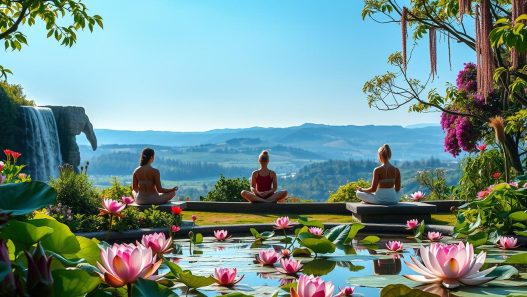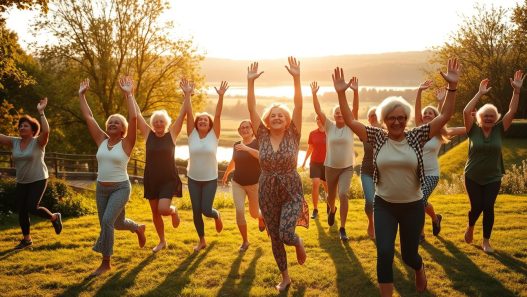As the summer months come, people look forward to the warmer weather and longer days. Studies show these changes can greatly affect our health and happiness. They might even help us live longer through longevity strategies.
Summer’s sunlight and warmth can lift our mood and energy. They also improve our physical health, bringing many summer health benefits. By using these benefits, we can start simple habits to better our health and maybe live longer.
This article will show you five easy ways to enjoy the longer summer days. These tips can help extend your life and improve your health.
Key Takeaways
- Boost your mood and energy levels with increased sunlight and warmer temperatures.
- Adopt simple habits to enhance your overall physical health and well-being.
- Discover practical ways to leverage summer health benefits for lifespan extension.
- Learn how to make the most of the longer summer days for improved health.
- Explore effective longevity strategies to promote a healthier and longer life.
The Science Behind Longer Days and Longevity
Research shows that daylight length affects human biology and might extend our lives. We’ll look into the science behind this, uncovering key factors.
How Sunlight Affects Human Biology
Sunlight starts a chain of biological responses important for our health. It impacts the production of melatonin and serotonin, two vital hormones.
Melatonin Production and Regulation
Melatonin, called the “sleep hormone,” is made in the dark. But sunlight during the day helps control its production. This ensures we sleep well and stay healthy, which is key for a long life.
Serotonin Pathways and Mood Enhancement
Sunlight also boosts serotonin, linked to mood, appetite, and sleep. More serotonin means better mood and less depression. This can lead to a longer, healthier life.
Circadian Rhythms and Their Impact on Lifespan
The circadian rhythm, or our internal clock, is shaped by daylight. Studies link a well-set circadian rhythm to better health and possibly longer life.
Research on Daylight Hours and Longevity
Research finds that areas with more daylight have longer-lived populations. While it’s not proven, the data hints at a daylight-longevity link.
Biological Clock Synchronization Benefits
Living in sync with daylight-dark cycles offers health perks. These include better sleep, metabolism, and overall health. This alignment is crucial for enjoying the longevity benefits of longer days.
Understanding the Connection Between Summer and Health
Summer brings health benefits like more outdoor fun and changes in how our bodies work. As we get into the warmer months, it’s key to know how summer impacts our health.
Seasonal Effects on Human Physiology
Summer changes how our bodies handle heat and how we process food. Our bodies sweat more to stay cool, but we must drink enough water to avoid dehydration.
Temperature Regulation and Metabolic Changes
Summer’s heat can make our metabolism speed up. This affects how we digest food and use nutrients.
Immune System Variations Throughout the Year
Our immune systems can change with the seasons. Some studies show our immune responses might be stronger in summer.
Why Summer Offers Unique Health Opportunities
Summer is great for getting healthier with outdoor fun and more daylight. Outdoor activities boost both our physical and mental health.
Accessibility of Outdoor Activities
The warm weather makes it perfect for outdoor fun like hiking, biking, and swimming. These activities are good for our hearts.
Psychological Benefits of Extended Daylight
Longer days can make us happier and help fight depression. This is because we get more sunlight.
| Health Aspect | Summer Benefits |
|---|---|
| Physical Activity | Increased opportunities for outdoor exercises |
| Mental Health | Improved mood due to longer daylight hours |
| Nutrition | Access to fresh, seasonal produce |
Using Longer Summer Days for Lifespan Extension: The Basics
Longer summer days are perfect for making lifestyle changes that can help us live longer. By using the benefits of more daylight, we can improve our health and well-being.
The Biological Benefits of Extended Daylight
Longer summer days offer many biological benefits. They help with hormonal balance and improve our body’s repair processes.
Hormonal Optimization Through Light Exposure
Light exposure is key for our hormonal balance. More daylight in summer helps our hormone levels, improving our health. For example, natural light boosts serotonin levels, which can make us happier and lower depression risk.
Cellular Regeneration and Repair Processes
Longer days give our bodies more time for repair. Adequate sunlight helps our circadian rhythms. This can make our bodies better at repairing and regenerating cells, leading to a longer, healthier life.
Setting Up Your Summer Longevity Plan
To get the most from longer summer days, create a longevity plan. First, check your current health and set health goals for the summer.
Assessing Your Current Health Status
Start by looking at your health. Think about your diet, exercise, sleep, and stress levels. This will show you where you can improve.
Creating Measurable Health Goals for Summer
After checking your health, set clear goals. You might want to walk more, eat more fruits and veggies, or practice meditation to reduce stress.
| Health Aspect | Current Status | Summer Goal |
|---|---|---|
| Physical Activity | 30 minutes/day | 60 minutes/day |
| Diet | Low fruit intake | 5 servings/day |
| Sleep Quality | 6 hours/night | 8 hours/night |
Way1: Optimize Vitamin D Production Through Strategic Sun Exposure
Summer brings longer days, perfect for boosting vitamin D through sun exposure. Vitamin D is key for strong bones, a healthy immune system, and overall health. It’s important to find the right balance between sun benefits and risks.
The Optimal Times for Safe Sun Exposure
The best time for sun exposure affects vitamin D production. Studies show that certain times of the day are better for making vitamin D.
Morning vs. Midday Sun Benefits
Midday sun is great for vitamin D, but morning sun is good too. Morning sun is gentler, which is better for your skin.
Duration Guidelines Based on Skin Type
How long you need in the sun depends on your skin. Lighter skin types need less time than darker ones. Aim for 10-30 minutes of sun on your face, arms, and legs during peak hours.
Balancing Sun Benefits Against Skin Cancer Risk
Sun exposure is good for vitamin D, but we must watch out for skin cancer. There are ways to protect yourself without blocking vitamin D.
Protective Measures That Don’t Block Vitamin D
Wear clothes that cover sensitive areas, stay in the shade when it’s hottest, and use sunscreen with SPF 30 or higher. These steps help prevent skin cancer while still letting you make vitamin D.
Identifying High-Risk Exposure Situations
Be careful in high places, near water or snow, and during the hottest hours (10 am to 4 pm). Knowing these risks helps you take the right precautions.
Tracking Your Vitamin D Levels Throughout Summer
It’s important to check your vitamin D levels to see if sun exposure is working. There are many ways to do this.
At-Home Monitoring Options
At-home vitamin D tests are easy to use. They involve a quick finger prick and send your sample to a lab for results.
Supplementation Strategies When Needed
If sun exposure doesn’t raise your vitamin D levels, you might need supplements. Talk to a doctor to find out the best way to supplement.
Way2: Leverage Extended Daylight for Enhanced Physical Activity
Summer’s longer days are perfect for getting more exercise. We can fit in more workouts and outdoor fun. This can make us healthier and maybe even live longer.
Morning vs. Evening Exercise: What Science Says
There’s a big debate about when to exercise. Studies show both morning and evening workouts have their own benefits.
Metabolic Advantages of Morning Workouts
Morning exercise boosts your metabolism. It helps you burn calories all day. It also makes you feel more alert and sets a good mood for the day.
Performance Benefits of Evening Exercise
Evening workouts are great for those who are stronger later in the day. They help with stress and prepare you for a good night’s sleep.
Outdoor Activities That Maximize Longevity Benefits
Doing outdoor activities during longer days can make exercise even better. Here are some great options:
- Brisk walking or hiking
- Cycling
- Swimming in outdoor pools or natural bodies of water
- Outdoor yoga or tai chi
High-Intensity Nature Workouts
Working out hard in nature is good for your heart and mind. Try trail running or outdoor boot camps for a great workout.
Low-Impact Activities for Joint Health
For people with joint problems, low-impact activities are best. Walking, water aerobics, or cycling are good. They’re easy on the joints but still good for your heart.
Creating a Summer Fitness Routine That Sticks
To enjoy the longer days, make a fitness plan that’s fun and easy to stick to.
Habit Formation During Longer Days
The longer days are great for starting new exercise habits. Try to work out at the same time every day to make it a habit.
Adapting Exercise to Summer Heat
It’s important to change your workout routine for the summer heat. Drink lots of water, wear the right clothes, and work out when it’s cooler to avoid getting sick.
| Activity | Benefits | Intensity |
|---|---|---|
| Brisk Walking | Cardiovascular health, mental well-being | Moderate |
| Cycling | Cardiovascular fitness, leg strength | Variable |
| Swimming | Full-body workout, low-impact | Variable |
Way3: Harness Summer’s Abundance for Nutritional Optimization
Summer brings a chance to improve our diet and live longer. The season is full of fresh fruits, veggies, and foods packed with nutrients. These can boost our health and wellbeing.
Seasonal Eating for Longevity: Summer Edition
Eating foods in season is key in summer. By choosing local, fresh produce, we get more vitamins and minerals.
Antioxidant-Rich Summer Fruits and Longevity
Fruits like blueberries, strawberries, and watermelon are full of antioxidants. These protect our cells and help us live longer. Adding these fruits to our diet is a great way to support longevity.
Hydrating Foods and Cellular Health
Foods like cucumbers and celery are not just hydrating. They also support our cells. These foods have electrolytes and nutrients that help our cells work well.

Growing Your Own Longevity Garden
Having your own garden is rewarding. It gives you fresh, nutritious food all summer. Even a small garden or a few pots can make a big difference.
Easy-to-Grow Superfoods for Beginners
Start with easy plants like leafy greens, herbs, and cherry tomatoes if you’re new to gardening. These are nutritious and easy to care for.
Maximizing Nutrient Density in Home Gardens
To get the most from your garden, use organic gardening practices. Make sure your soil is full of nutrients. Use compost or natural fertilizers to help plants grow well.
Preserving Summer Nutrients for Year-Round Benefits
Summer is a time of plenty, but think about saving nutrients for later. Freezing and fermentation can keep summer food’s nutritional value.
Freezing Techniques That Maintain Nutritional Value
Freezing is a simple way to save summer food. To keep nutrients, blanch vegetables before freezing. Store them in airtight containers to avoid freezer burn.
Fermentation for Enhanced Gut Health
Fermenting foods like sauerkraut and pickles is another great way to save nutrients. It makes foods rich in probiotics, which are good for our gut and overall health.
By using these methods, we can make the most of summer’s food to stay healthy and live longer all year.
Way4: Utilize Extended Evenings for Stress Reduction and Mental Health
Summer days are getting longer, giving us a chance to boost our mental health. The warm evenings are perfect for activities that help us relax.
Sunset Meditation Practices for Longevity
Meditation at sunset is great for your mind. The sky’s colors and the calm air make it a perfect spot for mindfulness.
Light-Based Meditation Techniques
Watching the sunset’s light change is a good way to meditate. It helps you focus and lowers stress.
Outdoor Mindfulness Exercises
Doing mindfulness outside in the evenings is also good. Walking or sitting in nature can calm your mind and reduce stress.
Social Connection in Summer: The Longevity Link
Summer evenings are great for meeting people. This is key for both mental health and living longer. Joining outdoor events can help you make friends.
Organizing Health-Focused Social Gatherings
Hosting or going to potluck dinners, yoga, or walks is a good idea. These activities help you connect and stay healthy.
Building Community Through Outdoor Activities
Doing things like going to concerts, farmers’ markets, or volunteering helps too. It builds friendships and improves your well-being.
Creating Evening Rituals That Enhance Sleep Quality
Having a calming evening routine is important for better sleep. Reading, stretching, or meditating tells your body it’s time to rest.
Transitioning from Daylight to Sleep Mode
Dimming lights and avoiding screens before bed helps your body wind down. It makes it easier to fall asleep.
Natural Sleep Aids for Summer Nights
Using essential oils like lavender or a white noise machine can also help. They make your sleep better during the summer.
Way5: Synchronize Your Sleep Schedule With Natural Light Patterns
Aligning your sleep with natural light can boost your well-being. As summer days get longer, adjusting your sleep schedule is key. This ensures you get the most from natural light.
Adjusting Sleep Timing for Optimal Circadian Alignment
To align your sleep with natural light, adjust your timing. Know how much sleep you need and when to go to bed. This should match the sun’s cycle.
Dawn Simulation and Morning Light Exposure
Dawn simulation wake-up lights signal it’s time to wake up. They make mornings feel more natural. Morning light also helps regulate your body’s rhythms.
Seasonal Sleep Duration Requirements
The amount of sleep you need doesn’t change with the seasons. But, the timing might. In summer, adjust your bedtime to get enough rest before dawn.
Managing Evening Light Exposure for Better Sleep
Evening light can affect your sleep quality. To manage this, reduce artificial light exposure.
Blue Light Blocking Strategies After Sunset
Blue light filtering glasses, apps, or software can reduce screen time’s impact on sleep.
Creating Darkness in Extended Daylight Hours
Blackout curtains or shades can make your bedroom dark. This is key for sleep, even when the sun sets late.
Creating the Ideal Summer Bedroom Environment
A cool, dark, and quiet bedroom is essential for quality sleep. Adjusting temperature and humidity can also improve sleep.
Temperature Optimization for Deep Sleep
Keeping your bedroom cool promotes deeper sleep. The ideal temperature is between 60-67°F (15-19°C), varying by person.
Humidity Control and Sleep Quality
A comfortable humidity level also affects sleep. Use a humidifier or dehumidifier to find the right range.
| Factor | Ideal Condition | Benefit |
|---|---|---|
| Temperature | 60-67°F (15-19°C) | Promotes deeper sleep |
| Humidity | 30-50% | Enhances comfort and sleep quality |
| Light Exposure | Darkness | Improves sleep duration and quality |
Common Mistakes When Using Summer for Health Optimization
Summer brings longer days, but it also comes with health risks. It’s important to know the common mistakes that can harm our health. These mistakes can ruin our efforts to stay healthy during this season.

Overexposure Pitfalls to Avoid
One big risk in summer is too much sun and heat. This can cause serious health problems, like heat exhaustion.
Heat Exhaustion Warning Signs
Heat exhaustion happens when we spend too much time in the heat without drinking enough water. Look out for heavy sweating, pale and cool skin, faint or weak pulse, and nausea or vomiting. If you see these signs, find shade, rest, and drink water right away.
Balancing Activity and Recovery
It’s key to balance outdoor fun with rest. Too much activity in the heat can be dangerous. Make sure to take breaks and drink plenty of water to stay safe.
Balancing Indoor and Outdoor Time
Finding the right mix of indoor and outdoor time is crucial. While being outside is good, too much sun and heat can be bad.
Creating Healthy Indoor Environments
To stay safe from extreme heat, make your indoor spaces healthy. Good ventilation, fans, or air conditioning, and a comfy temperature are important.
Transitioning Between Temperature Extremes
When moving from inside to outside, do it slowly. This helps avoid heat-related illnesses and keeps you comfortable.
Adapting These Strategies for Different Age Groups
It’s important to tailor summer health plans for different ages. As people get older, their needs and abilities change. This means we need to adjust our strategies to fit each age group.
Children and Teens: Building Lifelong Habits
Summer is a great time to teach kids and teens healthy habits. Activities like swimming, cycling, or team sports can make them love being active. Gardening or cooking can also teach them about eating well.
Adults: Maximizing Productivity and Health
Adults can use summer’s long days to get more done and stay healthy. Doing outdoor activities in the morning or late afternoon helps avoid too much sun. Adding meditation or yoga to their day can also improve their mood and health.
Seniors: Special Considerations for Summer Longevity
Seniors need special care in summer. They should drink plenty of water, stay cool, and go outside when it’s not too hot. Gentle exercises like tai chi or water aerobics help keep them moving and flexible.
| Age Group | Summer Activities | Health Benefits |
|---|---|---|
| Children & Teens | Outdoor sports, gardening | Develops healthy habits, improves physical fitness |
| Adults | Morning or late afternoon outdoor activities, stress-reduction techniques | Boosts productivity, enhances overall well-being |
| Seniors | Gentle exercises like tai chi or water aerobics | Maintains mobility, flexibility, and overall health |
Transitioning Your Routine as Summer Ends
Summer’s end is a great time to check and change our health habits for the next few months. As the seasons shift, keeping up the good work from the long days is key. We need to tweak our daily habits to keep moving forward towards a longer, healthier life.
Maintaining Benefits During Shorter Days
When days get shorter, it’s vital to keep the health gains we made in summer. A smart move is to add light therapy to our daily life. This helps make up for less sunlight in winter.
Light Therapy Options for Winter Months
Light therapy uses a special light that feels like natural daylight. It helps keep our body clocks in sync and boosts our mood when it’s darker outside.
Adjusting Exercise Routines for Indoor Settings
With colder weather, we need to switch our workouts to indoor activities. Options include yoga, indoor cycling, or gym workouts. The goal is to pick exercises we like and can keep up with.
Planning for Next Summer’s Longevity Strategy
As summer fades, it’s time to plan for next year’s health goals. We should track our progress and tweak our plans as needed.
Tracking Results and Adjusting Approaches
Keeping an eye on our health stats helps us see what works and what doesn’t. This way, we can fine-tune our strategies for better results.
Setting Progressive Health Goals Year to Year
Having new health targets each year keeps us moving forward. It’s about building on past successes and pushing ourselves to do even better.
Conclusion: Embracing the Summer Advantage for a Longer, Healthier Life
The longer summer days give us a chance to boost our health and live longer. We can make the most of this time by getting more vitamin D, being more active, and eating better.
By following the tips we’ve shared, like getting more vitamin D and staying active during the day, we can get healthier. Studies show that these summer habits can really improve our health and help us live longer.
As we move into the next season, it’s key to keep up the good work and plan for more health benefits. This way, we can keep enjoying the benefits of summer and live a healthier life. With a bit of planning and dedication, we can use summer to improve our health and set ourselves up for success in the long run.






